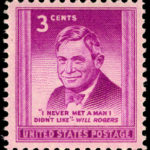Yesterday, in conversation with one of our practice members, we touched on an interesting subject. Since we’ve run into this issue a time or two before, I thought it might be a good idea to jot down a few thoughts that you might find of value.
There are some things that each of us does well for ourselves. For example, if the lights go out in a section of the house I’ll check the electrical panel to see if a tripped breaker needs to be reset. But if our air conditioner is running and still fails to cool the house, then we  call the heating and air specialist. I can repair a leaky faucet, but when the hot water heater leaks, I call a plumber. After all, none of us knows everything. It reminds me of what Will Rogers, the famous satirist wrote “We’re all ignorant, just on different subjects.”[1]
call the heating and air specialist. I can repair a leaky faucet, but when the hot water heater leaks, I call a plumber. After all, none of us knows everything. It reminds me of what Will Rogers, the famous satirist wrote “We’re all ignorant, just on different subjects.”[1]
We can’t be expected to know everything, that’s why we depend upon the expertise of others to handle the things that we don’t know. In fact it might be really foolish to do otherwise. But here’s the thing, sometimes the lines of expertise get a little fuzzy, which is what this article is about. In many cases the distinctions are so obvious that there could be no confusion. When it’s time to have a family portrait we use a professional photographer. Sure everyone could go down to the Department of Motor Vehicles, where they also take photos, but the DMV has neither the expertise nor desire to produce that treasured family portrait. Seems like a silly analogy, right? Yet crazier things go on all the time. The recent conversation is a good case in point.
In yesterday’s discussion with the woman in our practice, she said that a few days ago her medical doctor advised her not to continue her chiropractic care. This troubled her because she wasn’t having any medical problems, and she attributed much of her good health to the chiropractic care she had been receiving. We talked it over and I asked her if the physician had reviewed our records before offering advice about it. She laughed and said, “No, until I told him how pleased I was with my chiropractic care, he didn’t even know I was seeing you.”
“So let me see if I understand. He has no idea what your chiropractic needs are, no idea what we do for you, no idea how much or how often, nor any idea why we are doing what we do for you. Is that all correct?” I asked.
“That’s right” she said.
“So then has he offered advice about something he knows absolutely nothing about?” I asked.
“Well, when you put it that way, yes” she answered.
“I don’t know your physician, but I will say one thing with absolute certainty. Offering advice concerning something about which we know nothing is just foolishness.” I said.
Seeming a bit upset with him, she declared “What’s wrong with doctors? Does he think I’m stupid, or doesn’t he even care about me?”
“I’m sure he cares about you. The problem is that he’s been so well educated to treat injury and illness. But everyone tends to forget that physicians aren’t nearly so well versed in living healthfully. Chiropractic is one of the most essential basics that a person can do for their health and well-being, yet physicians generally know little or nothing about it.” I answered.
Physicians have studied long and hard about pathology and disease, and we must remember to value their advice on that, while realizing that their advice on things outside of their field is doubtful if not downright dangerous.
I don’t offer medical advice. As a chiropractor I offer to improve a person’s life by addressing vertebral subluxations because they interfere with that person’s ability to function. People need this, whether or not they have a medical problem. In rare instances a medical issue may affect how, where or when we do an adjustment. That’s because it can impact how certain procedures are performed. Chiropractors are well trained to know how to be safe and effective in delivering chiropractic care.
So when experts disagree, who are you supposed to listen to? Seems dicey, doesn’t it? Well actually, this isn’t so difficult to sort out. Keep in mind that chiropractic is a separate and distinct profession, not a part of the medical profession. So if your physician has a concern about your chiropractic care there’s a proper way to handle it. Give the doctor permission to request our records and encourage them to ask us questions about things they may not understand in the file. Once the physician knows how much you are benefiting from a life free of nerve interference, they should be all for it.
[1] Rogers, Will, From Nuts To The Soup, New York Times, August 31, 1924, https://www.nytimes.com/1924/08/31/archives/from-nuts-to-the-soup.html
